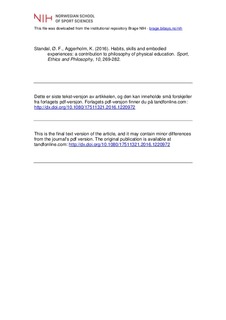Habits, skills and embodied experiences: a contribution to philosophy of physical education
Journal article, Peer reviewed
Accepted version
Permanent lenke
http://hdl.handle.net/11250/2498817Utgivelsesdato
2016Metadata
Vis full innførselSamlinger
- Artikler / Articles [2119]
Sammendrag
One of the main topics in philosophical work dealing with physical education is if and how the subject can justify its educational value. Acquisition of practical knowledge in the form of skills and the provision of positive and meaningful embodied experiences are central to the justification of physical education. The purpose of this article is to explore the relationship between skill and embodied experience in physical education through the notion and concept of habit. The literature on phenomenology of skill acquisition is first considered. In particular, we draw on Merleau-Ponty’s notion of habit. Further, we introduce pragmatist philosophy and in particular the work of John Dewey as a useful complement to the phenomenological perspective. It is in particular Dewey’s emphasis on habits, experience and education that are found to be useful in our exploration of the relationship between the two justifications under consideration, because it allows us to point out the importance of habits of attentiveness.
Beskrivelse
I Brage finner du siste tekst-versjon av artikkelen, og den kan inneholde ubetydelige forskjeller fra forlagets pdf-versjon. Forlagets pdf-versjon finner du på tandfonline.com / In Brage you'll find the final text version of the article, and it may contain insignificant differences from the journal's pdf version. The definitive version is available at tandfonline.com
